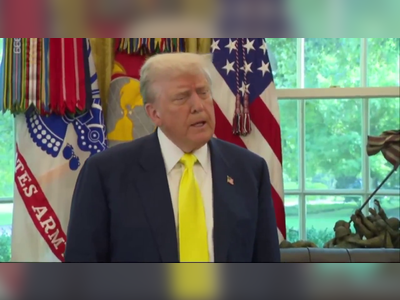
Friedrich Merz Faces Challenges as German Election Approaches
With polls showing a dip in support, the CDU leader is navigating scrutiny and competition from the far-right AfD.
As Germany prepares for its upcoming national election, Friedrich Merz, leader of the Christian Democratic Union (CDU) and a key candidate for chancellor, finds himself facing mounting challenges.
Recent polling indicates a slight decline in the CDU’s support, with the party dropping below 30% in a YouGov poll for the first time since mid-2024. This shift has sparked concerns within the CDU as scrutiny intensifies ahead of the vote.
Internal and External Pressures
Merz’s campaign has been marked by behind-the-scenes dissatisfaction within his party.
Reports of internal doubts about strategy have emerged, alongside public acknowledgments of the Alternative for Germany (AfD) gaining momentum.
Outgoing CDU lawmaker Thomas Heilmann recently described the AfD as the only party currently showing significant growth in the polls.
Merz, 69, is seen as a figure reminiscent of earlier CDU leadership under Helmut Kohl.
His return to the political forefront in 2018 followed a period of absence during Angela Merkel’s chancellorship.
While Merz’s leadership has been supported by traditionalist factions within the party, his campaign has faced criticism for its cautious approach, which some have likened to that of UK Labour leader Keir Starmer.
Competition from the AfD
The far-right AfD has capitalized on the political landscape, with its co-leader Alice Weidel gaining attention for her unorthodox background and social media presence.
The AfD’s polling has recently surpassed 20%, presenting a significant challenge to the CDU and other mainstream parties.
Despite this, Merz remains a key figure in coalition discussions, with potential partners including the Social Democrats and Greens.
Broader Political Context
Merz’s campaign strategy, which avoids controversial stances, has left space for competitors to capture public attention.
However, his tenure has been marked by efforts to maintain stability within the CDU and to position the party as a viable governing option in a shifting political environment.
The CDU’s results will likely influence post-election coalition negotiations and broader policymaking.
European Implications
Germany’s election carries significant weight within the European Union, where domestic political shifts in member states can impact policy direction.
With the AfD’s rise and internal divisions within the CDU, the results of this election may shape Germany’s role in European leadership and policy-making in the years to come.
This report is based on verified information, with additional insights contributed by Jonathan Packroff.
Recent polling indicates a slight decline in the CDU’s support, with the party dropping below 30% in a YouGov poll for the first time since mid-2024. This shift has sparked concerns within the CDU as scrutiny intensifies ahead of the vote.
Internal and External Pressures
Merz’s campaign has been marked by behind-the-scenes dissatisfaction within his party.
Reports of internal doubts about strategy have emerged, alongside public acknowledgments of the Alternative for Germany (AfD) gaining momentum.
Outgoing CDU lawmaker Thomas Heilmann recently described the AfD as the only party currently showing significant growth in the polls.
Merz, 69, is seen as a figure reminiscent of earlier CDU leadership under Helmut Kohl.
His return to the political forefront in 2018 followed a period of absence during Angela Merkel’s chancellorship.
While Merz’s leadership has been supported by traditionalist factions within the party, his campaign has faced criticism for its cautious approach, which some have likened to that of UK Labour leader Keir Starmer.
Competition from the AfD
The far-right AfD has capitalized on the political landscape, with its co-leader Alice Weidel gaining attention for her unorthodox background and social media presence.
The AfD’s polling has recently surpassed 20%, presenting a significant challenge to the CDU and other mainstream parties.
Despite this, Merz remains a key figure in coalition discussions, with potential partners including the Social Democrats and Greens.
Broader Political Context
Merz’s campaign strategy, which avoids controversial stances, has left space for competitors to capture public attention.
However, his tenure has been marked by efforts to maintain stability within the CDU and to position the party as a viable governing option in a shifting political environment.
The CDU’s results will likely influence post-election coalition negotiations and broader policymaking.
European Implications
Germany’s election carries significant weight within the European Union, where domestic political shifts in member states can impact policy direction.
With the AfD’s rise and internal divisions within the CDU, the results of this election may shape Germany’s role in European leadership and policy-making in the years to come.
This report is based on verified information, with additional insights contributed by Jonathan Packroff.
Translation:
Translated by AI
AI Disclaimer: An advanced artificial intelligence (AI) system generated the content of this page on its own. This innovative technology conducts extensive research from a variety of reliable sources, performs rigorous fact-checking and verification, cleans up and balances biased or manipulated content, and presents a minimal factual summary that is just enough yet essential for you to function as an informed and educated citizen. Please keep in mind, however, that this system is an evolving technology, and as a result, the article may contain accidental inaccuracies or errors. We urge you to help us improve our site by reporting any inaccuracies you find using the "Contact Us" link at the bottom of this page. Your helpful feedback helps us improve our system and deliver more precise content. When you find an article of interest here, please look for the full and extensive coverage of this topic in traditional news sources, as they are written by professional journalists that we try to support, not replace. We appreciate your understanding and assistance.











